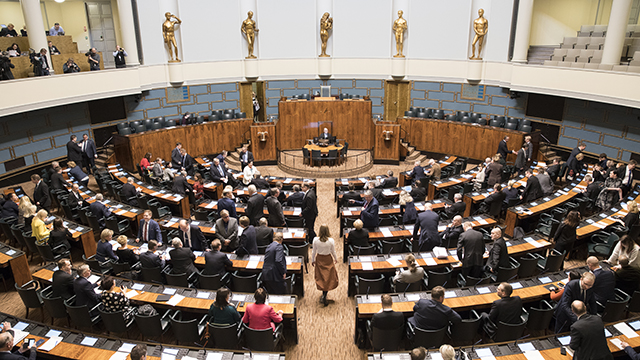Digital Parliamentary Data in Action (DIPADA 2022)
Workshop co-located with the 6th Digital Humanities in the Nordic and Baltic Countries Conference (DHNB 2022), Online
March 15, 2022, Uppsala, Sweden

Call for Papers and Participation
Recent years have seen the emergence of new digital parliamentary datasets that highlight multi-disciplinary opportunities and challenges in research. These new datasets have enabled researchers to engage in novel ways in exploring and studying parliamentary culture, media and politics, polemics and consensus, and other areas where parliamentary debates function as a lens on societal and cultural matters. At the same time, ongoing research projects have highlighted the limitations of these “first-generation” datasets in their scope, structure, and usability. This has led to demands on improvements regarding OCR-quality, metadata, markup processes, and transforming national datasets into uniform advanced data structures, such as Parla-CLARIN and Linked Data.
Recent years have seen the emergence of new digital parliamentary datasets that highlight multi-disciplinary opportunities and challenges in research. These new datasets have enabled researchers to engage in novel ways in exploring and studying parliamentary culture, media and politics, polemics and consensus, and other areas where parliamentary debates function as a lens on societal and cultural matters. At the same time, ongoing research projects have highlighted the limitations of these “first-generation” datasets in their scope, structure, and usability. This has led to demands on improvements regarding OCR-quality, metadata, markup processes, and transforming national datasets into uniform advanced data structures, such as Parla-CLARIN and Linked Data.
The accessibility of parliamentary data is a democratic issue and raises questions about how such datasets can be used to empower citizen participation and enhance the transparency of political work and decision making. Hence, curation and research of parliamentary records, as well as the development of new tools and user interfaces relevant for the parliamentary data are embedded in critical societal discussions, and bear consequences from both scholarly and citizen perspectives.
These developments have led to enhanced opportunities and challenges for research and development. The workshop therefore draws together scholars across different disciplines to explore and showcase results and ongoing work on creating, publishing, and using digital parliamentary data in Digital Humanities research and applications. The aim is to foster interaction between the scholars in the humanities, social sciences, and computational sciences.
More datails about the workshop can be found on pagehttp://dhnb.eu/conferences/dhnb2022/workshops/dipada/
Important Dates
- January 13: Deadline for submitting the papers
- February 15: Notification of acceptance (peer-review results)
- March 8: Submission of final revised papers, taking into account reviewers’ comments
- March 15: The workshop takes place
Workshop Organizing Committee
- Matti La Mela matti.lamela@abm.uu.se, Uppsala University and University of Helsinki (HELDIG)
- Fredrik Norén, fredrik.noren@umu.se, Umeå University
- Eero Hyvönen, eero.hyvonen@aalto.fi, Aalto University and University of Helsinki (HELDIG)
Workshop Programme Committee
- Eero Hyvönen, Aalto University and University of Helsinki (HELDIG), chair
- Kaspar Beelen, The Alan Turing Institute
- Kimmo Elo, University of Turku
- Tomaž Erjavec, Jozef Stefan Institut
- Darja Fišer, University of Ljubljana
- Jo Guldi, Southern Methodist University
- Laura Hollink, CWI Amsterdam
- Pasi Ihalainen, University of Jyväskylä
- Matti La Mela, Uppsala University and University of Helsinki (HELDIG)
- Måns Magnusson, Uppsala University
- Bruno Martins, University of Lisbon
- Costanza Navarretta, University of Copenhagen
- Fredrik Norén, Umeå University
- Jouni Tuominen, University of Helsinki
Program
To be announced later
Registration
At least one author of each paper needs to register to the DHNB 2022 conference
in order to participate in the workshop. The workshop is open for all conference participants.

